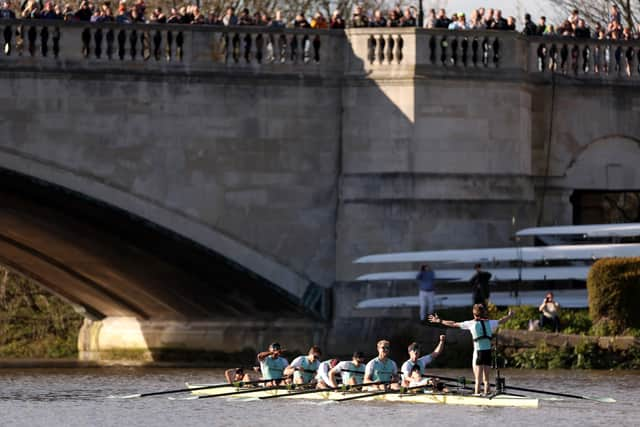Oxford blame E. coli strain as Cambridge triumph at The Boat Race
and live on Freeview channel 276
Oxford University blamed the presence of E. coli in the River Thames as one of the reasons they fell to a crushing defeat against rivals Cambridge University in The Boat Race on Saturday afternoon.
The light blues retained their title of Boat Race champions comfortably, holding on convincingly even as stroke man Matt Edge appeared to collapse from exhaustion in the final few hundred metres. Oxford had been billed as favourites for the blockbuster rowing event but were humbled on the Tideway.
Advertisement
Hide AdAdvertisement
Hide AdSpeaking after the race, Oxford rower Leonard Jenkins told the BBC that 'a few guys' in his boat had picked up an E. coli strain due to pollution in the water. Earlier this week, The Boat Race warned crews not to throw their coxswains in the water when celebrating due to health concerns raised by River Action.
Reacting to the defeat, Jenkins said: "I don't have any words. We had a clear plan of what we wanted to do and a clear set-up. The last couple of days have been amazing but it didn't come together on the day. It's been a great battle and I couldn't be prouder.
"I didn't expect it to be such a big difference. I will also say, and this is no way to take away from Cambridge, we've had a few guys go down badly with the E. coli strain. This morning I was throwing up and I wasn't sure there was going to be a chance for me to be in the boat. I ultimately kept that quiet and it's on my shoulders.
"I'm not sure if it was the right choice because I really didn't feel like I had much to give in that. It would have been ideal not to have poo in the water but that's not to take away from Cambridge. They are a talented crew and I don't know if we would have had a chance to get them even if we'd all be on form."


Advertisement
Hide AdAdvertisement
Hide AdIt looked destined to be a feisty race with the two universities neck-and-neck off the start in Putney, almost clashing blades a number of times as umpire Matthew Pinsent bellowed warnings at the boats.
Making the most of their Surrey station, Cambridge did eventually pull ahead and held off an Oxford push through Hammersmith Bridge in style. A make-or-break point in the race, the light blues then kicked up a gear as Oxford looked defeated.
The race nearly took a dramatic turn at the end as Edge fought exhaustion, struggling to stay upright and lead his crew. In the incident, Oxford took back some distance but that damage was already done for the challengers.
Earlier this week, the River Action campaign group found an average of 2,869 E coli colony forming units (CFU) per 100ml of water in 16 tests around Hammersmith Bridge.
Advertisement
Hide AdAdvertisement
Hide AdThe Environment Agency's inland bathing water quality standards decree that the level should be below 1,000 CFU per 100 ml. The bacteria, which is found in faeces, can cause urinary tract infections, cystitis, vomiting and even life-threatening blood poisoning.


According to River Action, the poor river quality is believed to be linked to Thames Water discharging sewage directly into the river and its tributaries. This conclusion was drawn based on publicly-available data which showed that Thames Water had discharged sewage into the Greater London area of the Thames for 1,914 hours from the start of 2024 to March 26.
In a statement to The Guardian, the Boat Race said: “Water quality is an ongoing concern for the Boat Race. We have put in place a series of precautionary measures this year to protect the health of our athletes, which includes guidance regarding the covering up of open wounds, regular handwashing, a cleansing station at the finish area and highlighting the risks of entering the water. We will also be taking on board British Rowing’s recent Poor Water Quality Guidance, issued in partnership with River Action, as we look forward to the Gemini Boat Race 2024.”
In a statement, Thames Water said: “Taking action to improve the health of rivers is a key focus for us and we want to lead the way with our transparent approach to data. We remain the only company to provide live alerts for all untreated discharges and this ‘near real-time’ data is available to customers as a map on our website.
Advertisement
Hide AdAdvertisement
Hide Ad“We have experienced higher than average long-term rainfall across London and the Thames Valley with groundwater levels exceptionally high for the time of the year. The overflows are designed to operate automatically when the sewer network is about to be overwhelmed which then releases diluted wastewater into rivers, rather than letting it back up into people’s homes.
“We are working hard to make these discharges unnecessary and have published plans to upgrade over 250 of our sites, including a £100 million upgrade of our Mogden sewage treatment works in south-west London to treat the high volumes of incoming sewage and reduce the need for overflows during wet weather.”
Comment Guidelines
National World encourages reader discussion on our stories. User feedback, insights and back-and-forth exchanges add a rich layer of context to reporting. Please review our Community Guidelines before commenting.
